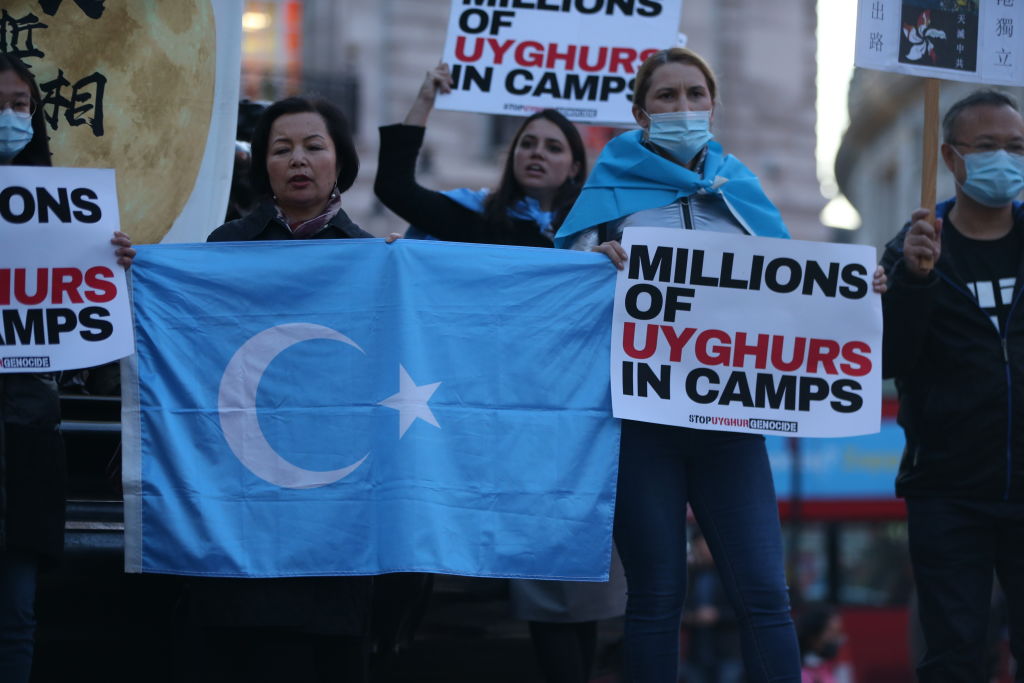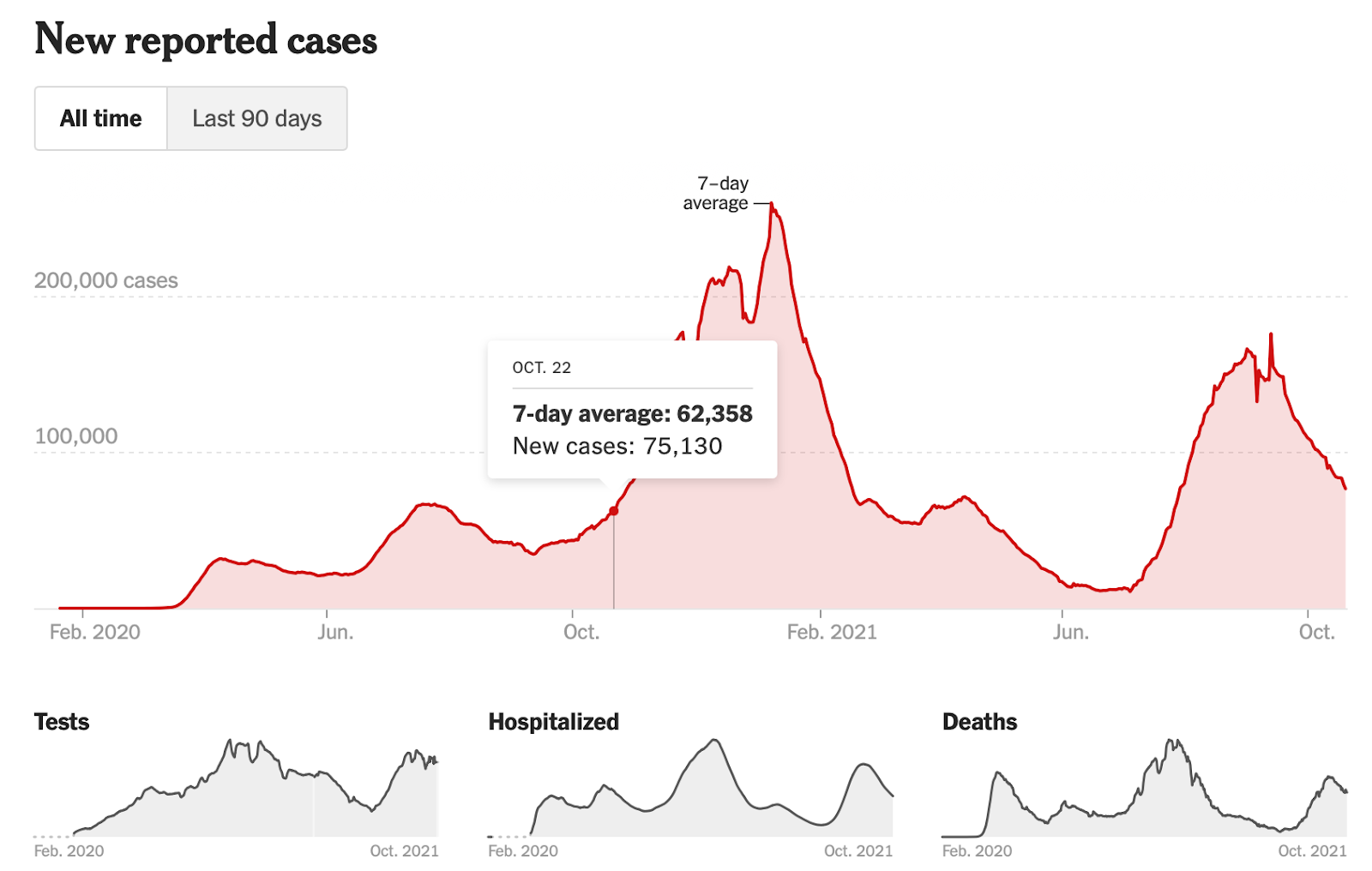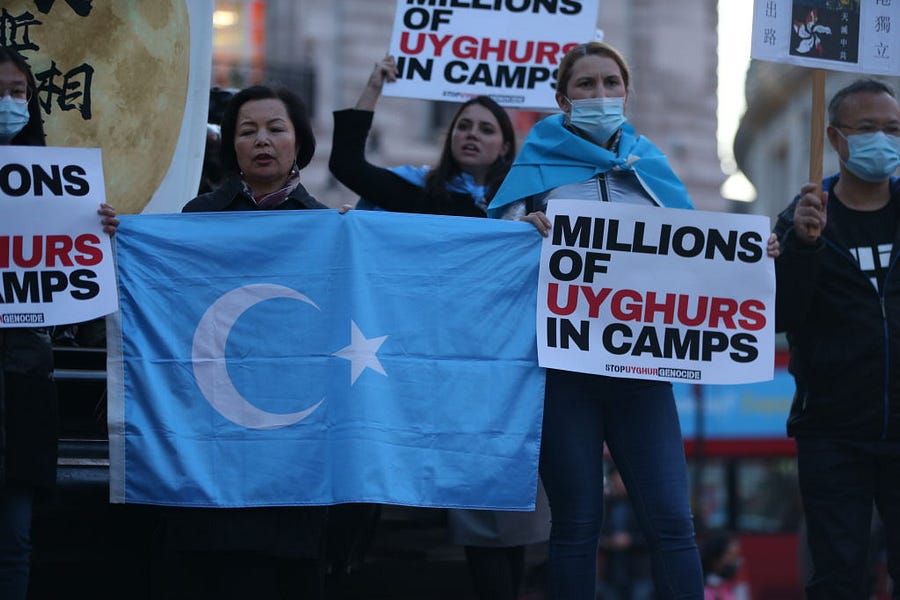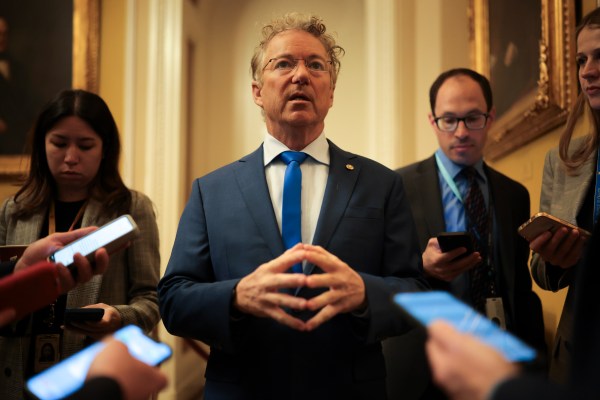Happy Friday! We’re really loving the “I swear, I will turn this car around!” energy of Senate budget reconciliation negotiations lately.
Quick Hits: Today’s Top Stories
-
The Federal Reserve Board announced Thursday it will implement a new set of rules prohibiting Federal Reserve policymakers and senior staff from purchasing individual securities and restricting their ability to actively trade. The move comes just weeks after two regional Federal Reserve presidents embroiled in ethics scandals announced their resignations.
-
National Institutes of Health Principal Deputy Director Lawrence Tabak sent a letter to GOP Rep. James Comer on Wednesday confirming that the NIH funded coronavirus research at the Wuhan Institute of Virology (WIV) through grantee EcoHealth Alliance. Tabak is adamant that the bat coronaviruses studied under the NIH grant “are not and could not have become SARS-CoV-2,” but the letter calls into question previous denials from Dr. Anthony Fauci and other public health officials that the NIH never funded gain-of-function research at the WIV.
-
Emails acquired by Parents Defending Education and reviewed by the Washington Free Beacon appear to show White House officials were aware of the National School Board Association’s (NSBA) plans to send a letter to President Biden requesting federal law enforcement “deal with the growing number of threats of violence and acts of intimidation” facing school board members weeks before the letter was released. Attorney General Merrick Garland testified before Congress on Thursday that he did not speak to the White House before issuing a memo on “threats against school officials and teachers,” but said that he was “sure” White House and Justice Department officials discussed the NSBA letter at some point.
-
Centers for Disease Control Director Dr. Rochelle Walensky on Thursday formally recommended COVID-19 vaccine booster shots for certain Moderna vaccine recipients six months after their second dose and all Johnson & Johnson vaccine recipients over 18 two months after their initial dose. The CDC recommendation, like yesterday’s FDA authorization, allows Americans to choose which vaccine they receive as a booster dose.
-
Pfizer/BioNTech’s COVID-19 vaccine booster shot is 95.6 percent effective at preventing symptomatic COVID-19 infection relative to the vaccine’s original two-dose regimen, according to Phase III trial data—collected while Delta was the “prevalent strain” in circulation—published by the companies on Thursday.
-
The House voted 229-202 on Thursday to hold Steve Bannon, longtime adviser to former President Donald Trump, in contempt of Congress for refusing to comply with a subpoena from the January 6 select committee. Nine Republicans—including Reps. Peter Meijer, Anthony Gonzalez, and Nancy Mace—joined Democrats in supporting the measure.
-
The National Republican Senatorial Committee (NRSC) outraised its Democratic counterpart by about $1.5 million in September according to recent Federal Election Commission filings, leaving the GOP’s Senate campaign organization with about twice as much cash on hand just more than a year out from the midterm elections.
-
Initial jobless claims decreased by 6,000 week-over-week to 290,000 last week, the Labor Department reported on Thursday.
Scoop: The U.S. Admitted Zero Uyghur Refugees in Fiscal Year 2021

When Harvest and Haley began working on a story about the United States’ failure to prioritize admissions of Uyghur refugees in recent years despite the ongoing genocide in Xinjiiang province, neither of them expected the number resettled to the United States in fiscal year 2021 literally to be zero. But on Thursday, a State Department spokesperson confirmed that to be the case.
“A recent State Department report on admissions details countries of origin for refugees who were resettled from the beginning of October 2020 through the end of September 2021,” they write in the latest edition of Uphill. “According to that document, not a single refugee of Chinese nationality—including Uyghurs and other ethnic minorities from Xinjiang—was resettled in America through the program in that time.”
Asked why no Uyghur refugees were resettled, a White House spokesman referred The Dispatch to the State Department and said it is “something we take very seriously and something the president is committed to.”
Refugees from China have consistently represented a slim portion of total admissions in recent years, but a notable downward trend has been evident since 2016.
There were none admitted through the program in fiscal year 2020, one in 2019, six in 2018, 24 in 2017, and 57 in 2016.
Part of this is because China makes it exceptionally difficult for refugees to escape. But those who do make it out of the country must also overcome bureaucratic hurdles and slow processing of their asylum claims.
“Everywhere is checkpoints, cameras. It’s very hard for people to move from one place to another,” Mustafa Aksu with the Uyghur Human Rights Project told The Dispatch of Xinjiang. He said Chinese officials refuse to renew or issue passports to Uyghurs and will confiscate passports from individuals who have them. And Uyghurs in other countries run into challenges when trying to apply for the refugee program because of administrative backlogs and issues like expired passports.
China has forcibly detained between 1 million and 3 million Uyghur Muslims and other ethnic minorities in detention camps in Xinjiang. And both the Trump and Biden State Departments have formally declared the atrocities a genocide.
Survivors of the camps have testified about being subject to horrific abuse while in detention. Tursunay Ziyawudun, a concentration camp survivor, told members of Congress earlier this year that she was raped by guards on multiple occasions and tortured with electric batons. She also described being malnourished, crowded with other detainees, and forced to renounce her religious beliefs.
“If we asked questions, we were beaten,” Ziyawudun testified.
The number of refugees admitted to the United States fell to record lows under former President Donald Trump. On the campaign trail last year, President Biden pledged to raise the refugee cap significantly.
But [Biden’s] actions in office have not matched his rhetoric. He raised the refugee cap for fiscal year 2021 from Trump’s historically low 15,000 spots to 62,500 after facing pressure from Democratic lawmakers. But America allowed only 11,411 refugees into the country in total between October 2020 and the end of September—the lowest number since the refugee admissions program began in 1980.
Biden reportedly feared political blowback about raising the refugee cap from voters who might wrongly conflate it with the influx of asylees on the southern border.
Biden raised the refugee cap even higher to 125,000 spots for this fiscal year, and the State Department assured Congress in its report on the upcoming year’s refugee admissions goals that Uyghurs and other Muslim ethnic minorities facing persecution by China will be prioritized. Still, the administration has not yet formally extended a special priority status to Uyghurs to make it easier for them to apply for asylum.
Some lawmakers are pushing for the United States to admit more Uyghurs and others being persecuted by the Chinese government—but the effort hasn’t made much progress since legislation with a bipartisan roster of supporters was introduced in both chambers in the spring.
“We must open our doors more widely to those seeking freedom,” Rep. Chris Smith, a New Jersey Republican, said this week.
Smith was one of several members of the Congressional Executive Commission on China who met Tuesday to hear from experts and refugees about how best to respond to the Chinese government’s genocide of ethnic Muslims in Xinjiang and its repression of Hong Kongers.
The lawmakers on the commission were largely in agreement: While the U.S. government has taken action to punish Chinese officials responsible for the genocide in Xinjiang and the crackdown on freedom in Hong Kong, including through sanctions, it is not doing enough to affirmatively help individuals hurt by these events. The United States, they argued, should admit more refugees from Xinjiang and Hong Kong—not only those being oppressed, but also high-skilled workers who want to come to America.
“In the face of egregious violations of internationally recognized human rights, we need to take concrete steps to protect those harmed by authoritarian governments,” said Sen. Jeff Merkley, the Oregon Democrat who chairs the commission. “While we cannot control the Chinese government’s behavior, we have the power to protect the persecuted who come to our shores.”
When Will We Accept COVID-19’s Endemicity?
On October 22, 2020, the United States was averaging, per The New York Times, about 62,000 new COVID-19 cases, 45,700 hospitalizations, and 800 new COVID-19 deaths per day in what was the early stages of the country’s third wave that would go on to kill hundreds of thousands of people. One year later, all three of those figures are worse: 76,500, 57,700, and 1,500 as of Wednesday, respectively.

After a short-lived oasis in late spring and early summer, the highly transmissible Delta variant reared its ugly head and tore through the United States, ravaging unvaccinated pockets of the country for months. But there are plenty of reasons to believe that we are now through the worst of this thing, and well on our way to averting a second “dark winter.”
For starters, the trendlines are completely flipped from 2020. At this time last year, everything—cases, hospitalizations, deaths—was on its way up, and quickly. But over the past two weeks, the average number of daily new cases has fallen 24 percent, hospitalizations 18 percent, and deaths 15 percent. The Delta surge that laid waste to much of the South over the summer has abated, and the slight upticks in Colorado, New Hampshire, and Vermont that have replaced it in recent weeks are minor by comparison.
But more importantly, it’s an indisputable fact that most of the country has immunity to the virus at this point. More than 66 percent of the population has received at least one COVID-19 shot, and 57 percent are fully vaccinated. But even that doesn’t tell the full story, as tens of millions of unvaccinated Americans have acquired the ability to fight off the virus the hard way. “Delta caused a lot of immunity,” said Dr. Monica Gandhi, an infectious-disease specialist at the University of California-San Francisco, noting that southern states’ cases have fallen in recent weeks without the reimplementation of social distancing or mask mandates. “Of course their cases came down, because that’s what lots of exposure to a virus does—kind of in a two-month cycle.”
Between vaccination and natural immunity, Gandhi estimates the United States’ seroprevalence—the fraction of the population with some form of COVID-19 antibodies—to be about 84 percent after the most recent wave. “There’s lots of models that say it looks like we can get through Delta with anywhere from 85 to 90 percent,” she told The Dispatch. “So we’re getting there, right?”
The country is likely to get a shot in the arm [Editor: Ahem] on that front in the coming weeks, with the FDA and CDC preparing to authorize and recommend vaccines to the 28 million children in the United States ages 5 to 11. The White House announced plans on Wednesday to “ensure that, if a vaccine is authorized for children ages 5-11, it is quickly distributed and made conveniently and equitably available to families across the country.”
So much of our current pandemic posture is predicated on the fact that—despite their blessedly low risk of serious illness—children are not yet eligible to be vaccinated. So once that happens, are we done? “I think that we’re getting to endemicity, basically, I would say, eight weeks after the [age] 5-to-11 vaccine is available,” Gandhi said.
But endemicity—like beauty—is in the eye of the beholder. Germany, for example, decided a few months ago to shift its focus away from case numbers and tie restrictions—masking, lockdowns, etc.—to hospitalizations instead. “Because the at-risk groups are vaccinated, a high incidence doesn’t automatically mean an equally high burden on intensive care beds,” Jens Spahn, Germany’s health minister, said. “The incidence is increasingly losing significance, we now need more detailed information on the situation in clinics.” Spahn said earlier this week the country will likely move next month from a “state of emergency” to a “state of special caution.” Denmark, citing high vaccination rates, declared COVID-19 is “no longer a critical threat to society” back in early September.
Some U.S. states—particularly ones with Republican governors—have more or less done the same, whether or not they boast the vaccination rates to justify such a move. But in terms of the federal response—and the federal guidance on schooling, masking, etc. that comes with it—Dr. Anthony Fauci remains tethered to case counts as the pivotal metric. “In a country of our size, you can’t be hanging around and having 100,000 infections a day,” he told Axios on September 9. “You’ve got to get well below 10,000 before you start feeling comfortable.”
“It’s certainly going in the right direction,” Fauci told CNN a few weeks ago. “But we have to just be careful that we don’t prematurely declare victory in many respects. … We do want to celebrate and look forward to the fact that we are going in the right direction. But if you look at the history of the surges and the diminutions in cases over a period of time, they can bounce back.”
In a recent piece for the Washington Post, Gandhi noted that COVID-19 will never be fully “eradicated” like smallpox was for reasons having to do with “its high level of transmissibility, the ease with which its symptoms can be mistaken for other common respiratory infections, and the ability of the virus to be transmitted during asymptomatic or pre-symptomatic periods.”
Former FDA Commissioner Scott Gottlieb came to a similar conclusion in The Atlantic. “As we transition from the pandemic to the endemic phase of this virus, no bright line divides these two states,” he wrote. “We’ll straddle the two phases through this coming winter. Our progress will feel uncertain and disorderly because people will arrive at different estimates about how much of a threat COVID poses to them personally, and will feel different levels of resolve about how aggressively our society should try to confront it.”
Worth Your Time
-
As noted above, it’s become increasingly clear over the past few months that there isn’t going to be one single, nationwide “pandemic is over” moment. Some parts of the country came to that conclusion long ago, and others likely won’t for months—or years. In his latest New York Times column, Ross Douthat envisions how Blue America will eventually get to where Red America has been for a while now. “So as long as Covid stays in the news, it’s not hard to envision masking requirements for airplanes and trains persisting far into the future, much as we still try to foil Al Qaeda by taking off our shoes for airport security lines,” he writes. “Deep-blue America will have to decide, in a world that’s postpandemic but not post-Covid, whether it wants to become the safety-above-all caricature that deep-red America has made of it.”
-
If you’re interested in politics and policy, be sure to check out the debut episode of Jay Caruso’s new “Closer Consideration” podcast. In this first edition, Jay talks to Yuval Levin of the American Enterprise Institute about institutions: Why they’re so important, why trust in them is so low right now, and what people can do to restore that trust. “Given my role here, how should I behave? That is a question all of us should be asking all of the time,” Levin says. “Not just what do I want, not just how do I want to be seen, but given the role I have here—as a parent, or a neighbor, or a member of this church, or a worker, employer, congressman, president of the United States—given my role, how should I behave? It’s a simple question, and yet I think it could be an absolutely transformational one in the moment we’re living in now.”
Presented Without Comment
Toeing the Company Line
-
Presidential historian Tevi Troy rejoined Jonah on The Remnant yesterday for a wide-ranging conversation about wokeness, cancel culture, institution building, and much more.
-
On Thursday’s episode of Advisory Opinions, Sarah and David finish their analysis of President Biden’s Supreme Court Commission and discuss the latest developments (or lack thereof) on qualified immunity.
Let Us Know
Approximately 90 percent of The Dispatch staff will be staring at the clock all day until we get off work and are able to go see Dune or The French Dispatch in theaters. Which of these fall blockbusters are you most excited about?
-
Shang-Chi & The Legend of the Ten Rings
-
Dune
-
The French Dispatch
-
Eternals
-
Top Gun: Maverick
-
No Time to Die
-
Spider-Man: No Way Home
-
I’d rather read a book, make a good meal, catch an NFL game, or watch playoff baseball.
Reporting by Declan Garvey (@declanpgarvey), Andrew Egger (@EggerDC), Charlotte Lawson (@lawsonreports), Audrey Fahlberg (@AudreyFahlberg), Ryan Brown (@RyanP_Brown), Harvest Prude (@HarvestPrude), and Steve Hayes (@stephenfhayes).







Please note that we at The Dispatch hold ourselves, our work, and our commenters to a higher standard than other places on the internet. We welcome comments that foster genuine debate or discussion—including comments critical of us or our work—but responses that include ad hominem attacks on fellow Dispatch members or are intended to stoke fear and anger may be moderated.
With your membership, you only have the ability to comment on The Morning Dispatch articles. Consider upgrading to join the conversation everywhere.